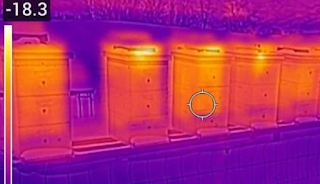Unveiling the Truth: Honeybee Insulation Reexamined
In a surprising turn of events, new research from the University of Leeds challenges long-standing beliefs about honeybee insulation. Derek Mitchell, a PhD student in the School of Mechanical Engineering, conducted a study that questions the traditional notion that honeybees naturally insulate their colonies against the cold. This revelation has significant implications for beekeepers and sparks a crucial debate on the ethical treatment of these vital pollinators.
Mitchell's study, published in the Journal of the Royal Society Interface, delves into the behavior of honeybee clusters during colder temperatures. Contrary to the established idea that the outer layer, known as the mantle, provides insulation to the core of the cluster, Mitchell's findings suggest that the mantle acts more like a heat sink, dissipating heat away from the center.
The consequences of this discovery are far-reaching. As outside temperatures drop, the heat required to sustain a comfortable temperature inside the hive increases. If the bees cannot generate enough heat, those near the hive wall become chilled, leading to a desperate huddling together. Mitchell warns that this clustering, once thought of as a protective measure, may actually result in increased stress due to cold and exertion, with some honeybees resorting to drastic measures like consuming their own young for survival.
Mitchell states, "In anthropomorphic terms, clustering is not a 'wrapping of a thick blanket' to keep warm but more like a desperate struggle to crowd closer to the 'fire' or otherwise die."
Raising Awareness and Urgent Calls for Change
Mitchell is not only challenging established beekeeping practices but also advocating for increased awareness of the welfare issues surrounding honeybee behavior. He urges a reevaluation of beekeeping practices, emphasizing the complex interplay between colony enclosure and thermofluids. Harvey M. Thompson, Professor of Computational Fluid Dynamics at the University of Leeds, sees the potential application of these findings in helping beekeepers in the future.
Mitchell's journey into this research began when his wife took up beekeeping, and he observed the continued use of outdated hive designs from the 1930s and 1940s. His expertise in mechanical engineering revealed a stark reality – most manufactured hives have seven times more heat loss than natural nests. Misconceptions about honeybee clustering, according to Mitchell, have arisen from observations in inadequately insulated hives, prompting a call for urgent changes in practices.
As we delve into the intricate world of honeybee behavior, Mitchell's research serves as a wake-up call. It's time to reassess our approach to beekeeping, considering the well-being of these essential pollinators and opening the door to ethical debates surrounding insect treatment.
HoneybeeInsulation, #BeekeepingEthics, #EnvironmentalAwareness, #BeeWelfare, #ResearchRevolution

